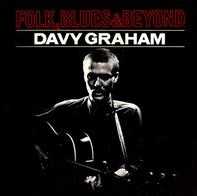Folk, Blues and Beyond
| Folk, Blues and Beyond | ||||
|---|---|---|---|---|
 | ||||
| Studio album by Davey Graham | ||||
| Released | January 1965 | |||
| Genre | Folk, folk baroque, Progressive folk, raga rock, blues, jazz | |||
| Length | 44:26 | |||
| Label | Topic | |||
| Producer | Ray Horricks | |||
| Davey Graham chronology | ||||
| ||||
| Professional ratings | |
|---|---|
| Review scores | |
| Source | Rating |
| Allmusic | |
Folk, Blues and Beyond is the second studio album by British musician Davey Graham, originally released in 1965.
It has been considered Graham's most groundbreaking and consistent work[2] and a defining record of the 20th century. It has also been a primary influence on some of the most popular musicians in Britain ranging from Bert Jansch to Jimmy Page and Eric Clapton.
His first album, The Guitar Player, was almost exclusively jazz based. He was also known for his collaborations with folksinger Shirley Collins, which had established his name in the purist folk communities in Britain.
In his Allmusic review, critic Richie Unterberger stated "This was Graham's most groundbreaking and consistent album. More than his solo debut The Guitar Player (which was pretty jazzy) or his previous collaboration with folk singer Shirley Collins, Folk Roots, New Routes, this established his mixture of folk, jazz, blues, and Middle Eastern music, the use of a bassist and drummer also hinting at (though not quite reaching) folk-rock. "Leavin' Blues," "Skillet (Good'n'Greasy)," and "Moanin'" are all among his very best folk-blues-rock performances, while on "Maajun" he goes full-bore into Middle Eastern music on one of his most haunting and memorable pieces. Covers of traditional folk standards like "Black Is the Colour of My True Love's Hair" and "Seven Gypsies" combine with interpretations of compositions by Bob Dylan ("Don't Think Twice, It's Alright"), Willie Dixon ("My Babe"), Charles Mingus ("Better Git in Your Soul"), and Reverend Gary Davis ("Cocaine") for an eclecticism of repertoire that wasn't matched by many musicians of any sort in the mid-'60s. If there is one aspect of the recording to criticize, it is, as was usually the case with Graham, the thin, colorless vocals. The guitar playing is the main attraction, though; it's so stellar that it makes the less impressive singing easy to overlook. Ten of the 16 songs were included on the compilation Folk Blues and All Points in Between, but Graham fans should get this anyway, as the level of material and musicianship is pretty high throughout most of the disc."
Most of the tracks on the album are a fusion of traditional western folk/blues and Middle-Eastern music. This synthesis of world sounds was inspired by Grahams frequent traveling across the Asian continent from the early 1950s onward.
Graham also utilizes jazz progressions to re-innovate and contemporize traditional sounds, especially on the blues tracks of the album. For example, the opening track is a cover of "Leavin' Blues", written by Lead Belly, which is a straightforward blues in C. Graham's version uses the DADGAD guitar tuning, and he speeds up the tempo to give it a more 'rocking' sound. His cover is also infused with an exotic, middle eastern sound, accredited to both the tuning and the exotic musical scales he uses throughout the song.
In 2002, a remastered CD version of the album was released in the UK.
Track listing
- "Leavin' Blues" (Lead Belly)
- "Cocaine" (Reverend Gary Davis)
- "Sally Free and Easy" (Cyril Tawney)
- "Black Is the Colour of My True Love's Hair" (Traditional)
- "Rock Me Baby" (Big Bill Broonzy)
- "Seven Gypsies" (Traditional)
- "Ballad of the Sad Young Men" (Fran Landesman and Tommy Wolf)
- "Moanin'" (Bobby Timmons)
- "Skillet (Good'n'greasy)" (Graham)
- "Ain't Nobody's Business What I Do" (Porter Grainger and Everett Robbins)
- "Maajun" (Davy Graham)
- "I Can't Keep from Cryin' Sometimes" (Blind Willie Johnson)
- "Don't Think Twice, It's All Right" (Bob Dylan)
- "My Babe" (Willie Dixon)
- "Goin' Down Slow" (J. Oden)
- "Better Get Hit in Yo' Soul" (Charles Mingus)
- 2002 reissue bonus tracks:
- "She Moved Through the Fair" (Traditional)
- "Mustapha" (Traditional)
- "Angi"(Davy Graham)
- "Davy's Train Blues" (Davy Graham)
- "3/4 A.D." (Davy Graham and Alexis Korner)
References
- ↑ Allmusic review
- ↑ Unterberger, Richie. "Davy Graham - Folk, Blues and Beyond". Retrieved 2008-12-12.